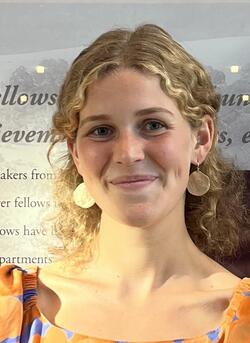A Summer of Research and Innovation for Stanford Undergrads at SHP
A Summer of Research and Innovation for Stanford Undergrads at SHP
Get to know our Undergraduate Summer Fellows who are working on a range of research projects to improve health and policy.

Four Stanford undergrads are spending their summer working on research projects with SHP faculty — from trying to fine-tune large language models (LLMs) used in scientific research, to improving health outcomes for children in rural communities, advancing an app that helps mothers at risk for preterm births and drafting a policy brief on treatment for breast cancer.
The Stanford Health Policy Undergraduate Research Fellowships are paid summer fellowships in which the students work closely with SHP faculty on compelling and impactful health policy questions.
“We look forward to welcoming our fourth cohort. It was hard to select among the pool of talented candidates,” said Eran Bendavid, MD, MS, a professor of health policy and co-director of the summer program. “We look forward to engaging our interns in health policy research and have them participate in our vibrant intellectual environment.”
Meet this year’s cohort:
Melody Chang: A rising junior majoring in Science, Technology and Society

Summer Project: Melody will lead interviews for the PretermConnect app designed by Jason Wang, MD, PhD, a professor of health policy and of pediatrics. She will work with Wang on gathering user insights and create policy recommendations for tech-driven maternal and infant care. The PretermConnect app aims to mitigate health disparities by providing education, support and remote monitoring for women at risk for preterm birth.
She chose a health policy project for her summer work because of her past work supporting the passage of California's hepatitis screening bill and introducing her own legislation for improved health education in California. “These experiences have shown me the profound impact that public policy can have on community health, inspiring me to seek opportunities to further develop my skills in this area and pursue a career that will allow me to enact long-term, sustainable change through this dynamic field," she said.
Fun Fact: Melody attended a performing arts middle and high school and trained in a classical piano conservatory for six years.

Margot Hutchins: A rising senior majoring in Mathematics

Summer Project: Margot will be working with Alyce Adams, PhD, MPP, professor of health policy and of epidemiology and population health, on a policy brief on prior authorization and either researching the implementation of community benefit policies or the impact of prior authorization on breast cancer treatment. “I find both of these potential projects highly exciting," Margot said. "They both enable me to utilize my math background to help advance equity, and hopefully find and provide solutions regarding financial inefficiency and barriers to successful care within health systems.”
Margot said she chose to spend her summer doing research in health policy because she hopes to become a physician and contribute to the public health and policy fields, combing her background in mathematics and data science with her passion for medicine.
“I believe that health policy can uniquely address some of the questions I find most interesting in medicine: How do we manage an aging population? How do we deliver equitable and culturally sensitive care? How do we make sure everyone can access the treatment they need?
Fun Fact: Margot was an extra in the Netflix movie, “Don’t Look Up.”
Robert Chibuzor Igbokwe: A rising senior majoring in Computer Science

Summer Project: Robert will be working with Lee Sanders, MD, MPH, a pediatrician and professor of health policy and of pediatrics, on the first stages of a multilevel research project focused on understanding the determinants of health outcomes for children in rural communities with multiple chronic conditions. Robert will evaluate the impact of a new Medi-Cal health-care model on rates of preventable hospitalizations for children nationwide, with the ultimate goal of identifying ways to improve pediatric patient outcomes.
“Although health policy is new to me, I am drawn by potential for data-driven research to inform and improve patient outcomes on a wide scale,” he said. “This summer fellowship will be perfect opportunity to develop practical skills in health policy research under the close mentorship of Stanford Health Policy's excellent faculty.”
Fun Fact: In middle school, Robert was the editor for the Harry Potter Fandom page.
Eva Moraa Tom: A rising junior majoring in Computer Science

Summer Project: She will be collaborating with Bendavid and MUIR Scholar Max Chew to fine-tune a large language model (LLM), such as ChatGPT, to enhance the efficiency of the systematic review process and better understand and process scientific literature, extract key information, and identify relevant studies more efficiently.
“This approach can significantly reduce the time and effort required for researchers to conduct systematic reviews, making the process faster and more manageable,” Eva said. She hopes the summer fellowship will help her gain insight into how researchers democratize access to research and to better understand the impact of global health policies on populations.
“This fellowship provides an opportunity to explore the intersection of research, policy, and real-world health outcomes, enhancing my knowledge and contributing to meaningful change in global health," she said.
Fun Fact: Eva speaks five languages and says: “I love peanuts, but I hate peanut butter because of the texture.”


